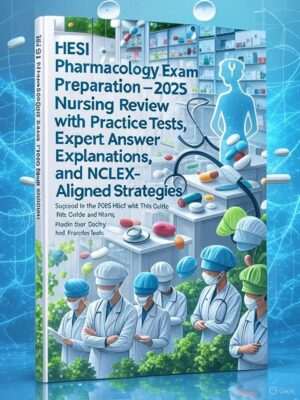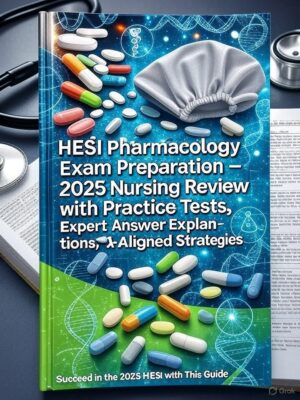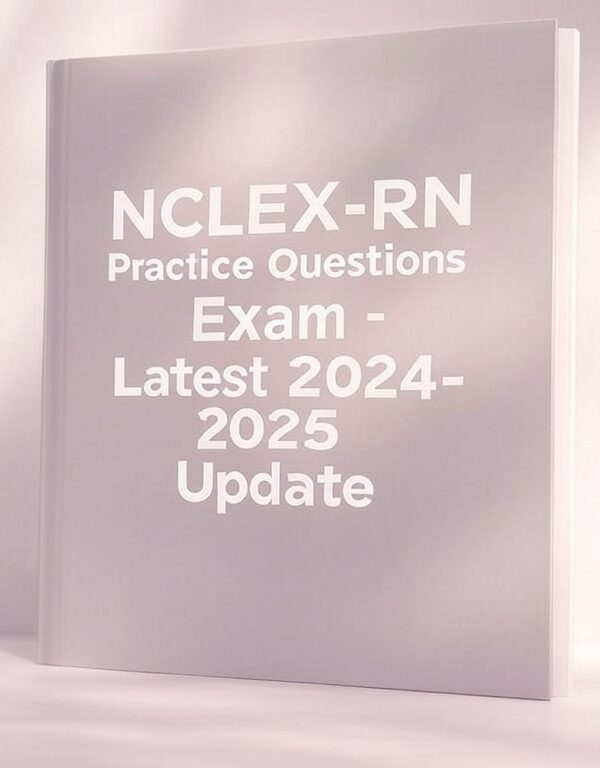-
Focused prep for HESI Pharmacology Exam 2025
-
Practice tests with expert answer explanations
-
NCLEX-aligned strategies for nursing students
-
Strengthens pharmacology knowledge for RN candidates
-
Boosts confidence for exam success
Preview
1.) Cycloserine (Seromycin) is added to the medication regimen for a client with
tuberculosis. Which of the following would the nurse include in the client-teaching plan
regarding this medication?
1. To take the medication before meals
2. To return to the clinic weekly for serum drug-level testing
3. It is not necessary to call the health care provider (HCP) if a skin rash occurs.
4. It is not necessary to restrict alcohol intake with this medication. – – correct ans- -2. To
return to the clinic weekly for serum drug-level testing Rationale:
Cycloserine (Seromycin) is an antitubercular medication that requires weekly serum drug
level determinations to monitor for the potential of neurotoxicity. Serum drug levels lower
than 30 mcg/mL reduce the incidence of neurotoxicity. The medication must be taken after
meals to prevent gastrointestinal irritation. The client must be instructed to notify the HCP if
a skin rash or signs of central nervous system toxicity are noted. Alcohol must be avoided
because it increases the risk of seizure activity.
2.) A client with tuberculosis is being started on antituberculosis therapy with isoniazid
(INH). Before giving the client the first dose, a nurse ensures that which of the following
baseline studies has been completed?
1. Electrolyte levels
2. Coagulation times
3. Liver enzyme levels
4. Serum creatinine level – – correct ans- -3. Liver enzyme levels Rationale:
INH therapy can cause an elevation of hepatic enzyme levels and hepatitis. Therefore, liver
enzyme levels are monitored when therapy is initiated and during the first 3 months of
therapy. They may be monitored longer in the client who is greater than age 50 or abuses
alcohol.
3.) Rifabutin (Mycobutin) is prescribed for a client with active Mycobacterium avium
complex (MAC) disease and tuberculosis. The nurse monitors for which side effects of the
medication? Select all that apply.
1. Signs of hepatitis
2. Flu-like syndrome
3. Low neutrophil count
4. Vitamin B6 deficiency
5. Ocular pain or blurred vision
6. Tingling and numbness of the fingers – – correct ans- -1. Signs of hepatitis
2. Flu-like syndrome
3. Low neutrophil count 5. Ocular pain or blurred vision
Rationale:
Rifabutin (Mycobutin) may be prescribed for a client with active MAC disease and
tuberculosis. It inhibits mycobacterial DNA-dependent RNA polymerase and suppresses
protein synthesis. Side effects include rash, gastrointestinal disturbances, neutropenia (low
neutrophil count), red-orange body secretions, uveitis (blurred vision and eye pain),
myositis, arthralgia, hepatitis, chest pain with dyspnea, and flu-like syndrome. Vitamin B6
deficiency and numbness and tingling in the extremities are associated with the use of
isoniazid (INH). Ethambutol (Myambutol) also causes peripheral neuritis.












Reviews
There are no reviews yet.